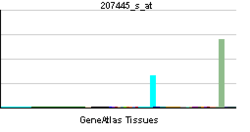CCR9
| View/Edit Human | View/Edit Mouse |
C-C chemokine receptor type 9 is a protein that in humans is encoded by the CCR9 gene.[3][4]
CCR9 has also recently been designated CDw199 (cluster of differentiation w199).
The protein encoded by this gene is a member of the beta chemokine receptor family. It is predicted to be a seven transmembrane protein similar to G protein-coupled receptors. Chemokines and their receptors are key regulators of thymocyte migration and maturation in normal and inflammatory conditions. The specific ligand of this receptor is CCL25. It has been found that this gene is differentially expressed by T lymphocytes of small intestine and colon, suggested a role in thymocyte recruitment and development that may permit functional specialization of immune responses in different segments of the gastrointestinal tract. This gene is mapped to the chemokine receptor gene cluster region. Two alternatively spliced transcript variants have been described.[4]
References
- ↑ "Human PubMed Reference:".
- ↑ "Mouse PubMed Reference:".
- ↑ Zaballos A, Gutierrez J, Varona R, Ardavin C, Marquez G (Jun 1999). "Cutting edge: identification of the orphan chemokine receptor GPR-9-6 as CCR9, the receptor for the chemokine TECK". J Immunol. 162 (10): 5671–5. PMID 10229797.
- 1 2 "Entrez Gene: CCR9 chemokine (C-C motif) receptor 9".
External links
- "Chemokine Receptors: CCR9". IUPHAR Database of Receptors and Ion Channels. International Union of Basic and Clinical Pharmacology.
Further reading
- Youn BS, Kim CH, Smith FO, Broxmeyer HE (1999). "TECK, an efficacious chemoattractant for human thymocytes, uses GPR-9-6/CCR9 as a specific receptor.". Blood. 94 (7): 2533–6. PMID 10498628.
- Zabel BA, Agace WW, Campbell JJ, et al. (1999). "Human G protein-coupled receptor GPR-9-6/CC chemokine receptor 9 is selectively expressed on intestinal homing T lymphocytes, mucosal lymphocytes, and thymocytes and is required for thymus-expressed chemokine-mediated chemotaxis.". J. Exp. Med. 190 (9): 1241–56. doi:10.1084/jem.190.9.1241. PMC 2195678
 . PMID 10544196.
. PMID 10544196. - Wurbel MA, Philippe JM, Nguyen C, et al. (2000). "The chemokine TECK is expressed by thymic and intestinal epithelial cells and attracts double- and single-positive thymocytes expressing the TECK receptor CCR9.". Eur. J. Immunol. 30 (1): 262–71. doi:10.1002/1521-4141(200001)30:1<262::AID-IMMU262>3.0.CO;2-0. PMID 10602049.
- Yu CR, Peden KW, Zaitseva MB, et al. (2000). "CCR9A and CCR9B: two receptors for the chemokine CCL25/TECK/Ck beta-15 that differ in their sensitivities to ligand.". J. Immunol. 164 (3): 1293–305. doi:10.4049/jimmunol.164.3.1293. PMID 10640743.
- Maho A, Bensimon A, Vassart G, Parmentier M (2000). "Mapping of the CCXCR1, CX3CR1, CCBP2 and CCR9 genes to the CCR cluster within the 3p21.3 region of the human genome.". Cytogenet. Cell Genet. 87 (3-4): 265–8. doi:10.1159/000015443. PMID 10702689.
- Kunkel EJ, Campbell JJ, Haraldsen G, et al. (2000). "Lymphocyte CC chemokine receptor 9 and epithelial thymus-expressed chemokine (TECK) expression distinguish the small intestinal immune compartment: Epithelial expression of tissue-specific chemokines as an organizing principle in regional immunity.". J. Exp. Med. 192 (5): 761–8. doi:10.1084/jem.192.5.761. PMC 2193265
 . PMID 10974041.
. PMID 10974041. - Papadakis KA, Prehn J, Nelson V, et al. (2000). "The role of thymus-expressed chemokine and its receptor CCR9 on lymphocytes in the regional specialization of the mucosal immune system.". J. Immunol. 165 (9): 5069–76. doi:10.4049/jimmunol.165.9.5069. PMID 11046037.
- Strausberg RL, Feingold EA, Grouse LH, et al. (2003). "Generation and initial analysis of more than 15,000 full-length human and mouse cDNA sequences.". Proc. Natl. Acad. Sci. U.S.A. 99 (26): 16899–903. doi:10.1073/pnas.242603899. PMC 139241
 . PMID 12477932.
. PMID 12477932. - Papadakis KA, Landers C, Prehn J, et al. (2003). "CC chemokine receptor 9 expression defines a subset of peripheral blood lymphocytes with mucosal T cell phenotype and Th1 or T-regulatory 1 cytokine profile.". J. Immunol. 171 (1): 159–65. doi:10.4049/jimmunol.171.1.159. PMID 12816994.
- Qiuping Z, Qun L, Chunsong H, et al. (2003). "Selectively increased expression and functions of chemokine receptor CCR9 on CD4+ T cells from patients with T-cell lineage acute lymphocytic leukemia.". Cancer Res. 63 (19): 6469–77. PMID 14559839.
- Gerhard DS, Wagner L, Feingold EA, et al. (2004). "The status, quality, and expansion of the NIH full-length cDNA project: the Mammalian Gene Collection (MGC).". Genome Res. 14 (10B): 2121–7. doi:10.1101/gr.2596504. PMC 528928
 . PMID 15489334.
. PMID 15489334. - Singh S, Singh UP, Stiles JK, et al. (2005). "Expression and functional role of CCR9 in prostate cancer cell migration and invasion.". Clin. Cancer Res. 10 (24): 8743–50. doi:10.1158/1078-0432.CCR-04-0266. PMID 15623660.
- Babu S, Blauvelt CP, Kumaraswami V, Nutman TB (2005). "Chemokine receptors of T cells and of B cells in lymphatic filarial infection: a role for CCR9 in pathogenesis.". J. Infect. Dis. 191 (6): 1018–26. doi:10.1086/427658. PMID 15717282.
- Sen Y, Yongyi B, Yuling H, et al. (2005). "V alpha 24-invariant NKT cells from patients with allergic asthma express CCR9 at high frequency and induce Th2 bias of CD3+ T cells upon CD226 engagement.". J. Immunol. 175 (8): 4914–26. doi:10.4049/jimmunol.175.8.4914. PMID 16210593.
- Nagakubo D, Jin Z, Hieshima K, et al. (2007). "Expression of CCR9 in HTLV-1+ T cells and ATL cells expressing Tax.". Int. J. Cancer. 120 (7): 1591–7. doi:10.1002/ijc.22483. PMID 17205512.
- Olaussen RW, Karlsson MR, Lundin KE, et al. (2007). "Reduced chemokine receptor 9 on intraepithelial lymphocytes in celiac disease suggests persistent epithelial activation.". Gastroenterology. 132 (7): 2371–82. doi:10.1053/j.gastro.2007.04.023. PMID 17570212.
This article incorporates text from the United States National Library of Medicine, which is in the public domain.
